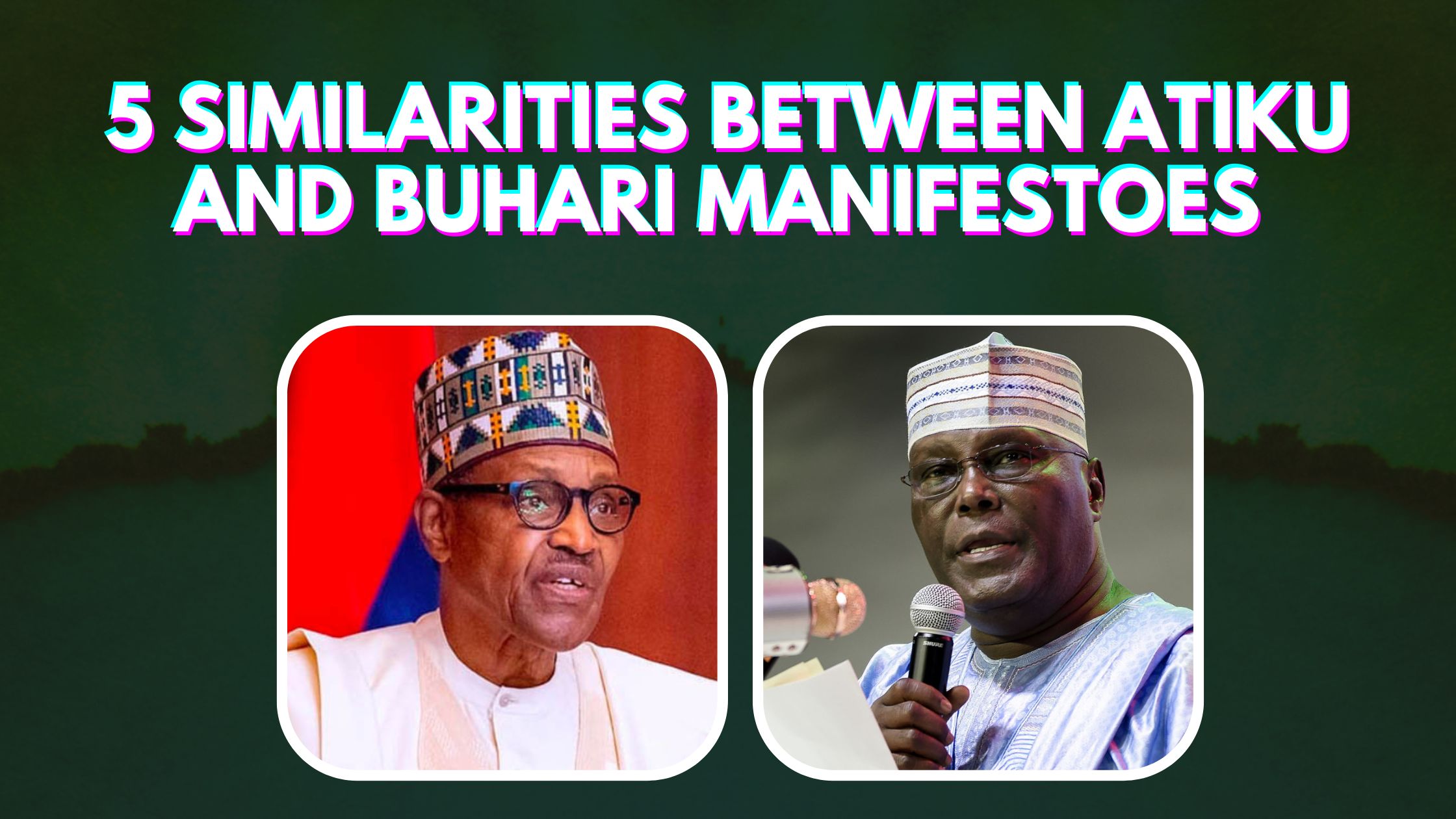Trends
5 Similarities Between Atiku and Buhari Manifestoes
In a bid to get to the truth of the economic Blueprint brouhaha, here are the similarities between Atiku and Buhari Manifestoes,

The 2023 Presidential candidate For the People’s Democratic Party (PDP), Alhaji Atiku Abubakar has recently been in the spotlight after he was accused by Minister of Information and Culture, Alhaji Lai Mohammed of copying the blueprint of the current administration as his manifesto.
Lai Mohammed, who spoke at a news conference in Abuja, also chastised Atiku for also displaying crass ignorance of the major policies and programs that have defined the Buhari administration and taken Nigeria to a new era of prosperity and good governance.
The Information minister said the administration was shocked that an opposition party that has on several occasions criticized Buhari’s policies is allegedly adopting it for its campaign and averred that the blueprint is a poor version of the present government’s economic strides.
Reacting to the allegation on Thursday, the PDP presidential campaign team in a statement made available to The PUNCH, described Mohammed’s claim as an attempt to “turn truth on its head”.
In a bid to get to the truth of the situation, RNN.NG has decided to check for any similarities between Atiku and President Buhari Manifestoes, prior to his emergence as the president of the country.
Read More:
- List of Nigerian Celebrities Running For 2023 Elections
- Meet The Top 10 Aspirants in the 2023 Presidential Election
- 2023 Election: Meet the Top 4 Presidential Candidates
1. Restructuring
One of the key manifestos of the All Progressives Congress, APC during the 2015 presidential election campaign was to restructure the country for absolute transformation. According to a report by Ochogwu Sunday on Daily post, Buhari’s restructuring promises are one of the things that gained him votes in 2015.
Obviously, the President is yet to deliver on his promises of restructuring the country. In June 2021, The president revealed his true intention for the country’s political system, vowing that his administration will not restructure the country, stressing that those agitating for separation and canvassing for restructuring are naive and ignorant of war.
Just like President Buhari, P DP 2023 presidential candidate Atiku Abubakar, has also begun his promises of restructuring the country. During his official declaration in march 2022, he revealed his Five point agenda for Nigerians, one of which is restructuring.
2. Poverty Reduction
Atiku Abubakar recently revealed that poverty reduction will be the centerpiece of his economic development agenda. He also proposed a $10bn Economic Stimulus Fund to support micro, small and medium scale enterprises (MSMEs) in a bid to resuscitate Nigeria’s ailing economy.
Similarly, in 2015, President Buhari proposed a N300bn Regional Growth Fund with an average of N50bn in each geo-political region; to be managed by the REDAs, to encourage private sector enterprise, and to support places currently reliant only on the public sector.
3. Security
It is absolutely normal for any administration to promise total security during his or her tenure. There is literary no governance without security. But what is the use of promises, without actions that will bring meaningful impact, President Buhari promised to consult and amend the Constitution to enable States and Local Governments to create cities, Local governments, and State Policing systems.
Only if the President began to implement the said policy tomorrow, Atiku on his part promised to deal with insurgency and insecurity relying mainly on an alternative approach to dispute resolution. The werey could not even defend Deborah’s death.
4. Debt Management
Alhaji Atiku Abubakar promised to review the country’s debt strategy by focusing on concessional and semi-concessional sources with lower interest rates and relatively long-term maturity. President Buhari on his part is a chronic Debtor, plunging the Nation into a debt crisis. According to a report on Premium Times, Nigeria’s Foreign Debt was at $7.3 billion when the Jonathan/ Yaradua administration came to an end in 2015.
By December 2020, Nigeria’s external debt has to $28.57 billion by December 2020, meaning an extra $21.27 billion had been accumulated under the Buhari administration — three times the combined amount by past governments since 1999. Similar scenario for the country’s domestic debt which stood at N16.02 trillion as of December 2020 — twice as much as the combined amount taken by the past three governments.
5. Infrastructure Development
Like President Buhari did in 2015, Atiku has begun to make numerous promises regarding the revitalization of the country’s infrastructure. First, he promised to ‘break the jinx’ in infrastructure financing. He also noted that ‘rebuilding infrastructure and reducing infrastructure deficit will enhance the carrying capacity of the economy and unleash growth and wealth creation.
Similarly, Buhari promised to create a National Infrastructural Development Bank to provide loans at nominal interest rates, exclusively for the sector. He also promised to embark on a National Infrastructural Development Programme in several parts of the country.
Buhari also promised to generate, transmit and distribute electricity on a 24/7 basis and ensure each of the 36 states has one functional airport.
Conclusion
There is no point elongating this content unnecessarily, Like someone said on Linda Ikeji’s Blog, this has been the plan of every Nigerian politician since the 10th century. If they can not even write a proper manifesto, how do they plan on governing the entire country? God epp us.
